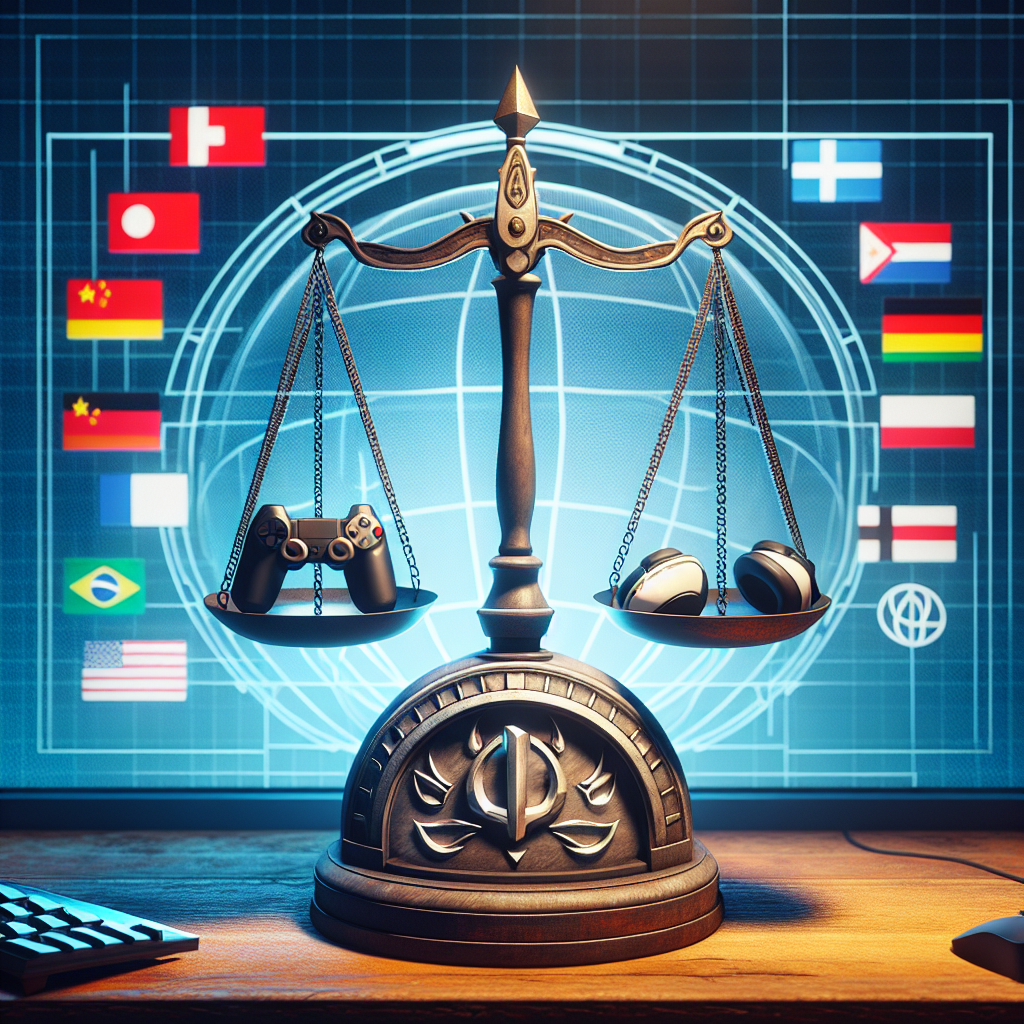As the popularity of online gaming tournaments continues to soar, ensuring the fairness of these competitions has become a crucial topic of discussion. From amateur players to professional esports teams, everyone wants a level playing field when competing for glory and prizes in virtual arenas. This article delves into the intricate world of online gaming tournaments fairness guidelines, exploring the key principles and regulations that govern fair play in this digital realm. By understanding these guidelines, players and organizers alike can uphold the integrity of online competitions and promote a fair and competitive environment for all participants.
Understanding Online Gaming Tournaments

Online gaming tournaments refer to organized competitions where players from around the world participate in various video games to showcase their skills and compete for prizes. These tournaments are typically held on gaming platforms or websites that host multiplayer games and provide a platform for players to challenge each other in a structured format.
Definition of Online Gaming Tournaments
Online gaming tournaments are structured events where players compete against each other in a series of matches or games to determine a winner. These tournaments can vary in format, including single-elimination brackets, round-robin leagues, or Swiss-system tournaments. Participants often register for these events in advance and follow a set schedule to compete against opponents of similar skill levels.
Rise in Popularity and Competitive Nature
In recent years, online gaming tournaments have surged in popularity due to the widespread availability of high-speed internet and the increasing interest in esports. Esports refers to competitive gaming at a professional level, with players often forming teams and representing organizations in tournaments with substantial prize pools. The competitive nature of online gaming tournaments has attracted a diverse range of players, from casual gamers looking to test their skills to professional esports athletes striving for glory and recognition.
Importance of Fairness and Guidelines
Fairness is a crucial aspect of online gaming tournaments to ensure that all participants have an equal opportunity to succeed and compete on a level playing field. Guidelines are established to govern player behavior, gameplay rules, anti-cheat measures, and dispute resolution processes to maintain fairness and integrity throughout the tournament. Adhering to these guidelines helps uphold the legitimacy of the competition and foster a positive and competitive environment for all players involved.

Key Components of Fairness Guidelines
Anti-Cheating Measures
In the realm of online gaming tournaments, implementing robust anti-cheating measures is paramount to maintaining fairness and integrity within the competitive environment. These measures serve as a shield against unethical behavior that could compromise the legitimacy of the competition. Here are some key components of anti-cheating measures that are commonly employed:
-
Use of Anti-Cheat Software: Online gaming tournaments often utilize sophisticated anti-cheat software that is designed to detect and prevent cheating in real-time. These programs employ various algorithms and mechanisms to identify unauthorized modifications or hacks that could give players an unfair advantage. By continuously monitoring gameplay and flagging suspicious activities, anti-cheat software acts as a vigilant guardian of fair play.
-
Strict Penalties for Cheating: To deter potential cheaters and uphold the integrity of the tournament, organizers typically enforce stringent penalties for those caught engaging in dishonest practices. These penalties can range from temporary suspensions and disqualifications to permanent bans, depending on the severity of the offense. By imposing consequences that reflect the seriousness of cheating, organizers send a clear message that unethical behavior will not be tolerated.
-
Fair Play Policies: Beyond just punitive measures, online gaming tournaments often establish clear fair play policies that outline the expected conduct of participants. These policies serve as a code of ethics that players are expected to adhere to, promoting sportsmanship, honesty, and respect among competitors. By setting clear expectations and standards for behavior, fair play policies create a level playing field where skill and strategy reign supreme.
Skill-Based Matchmaking
Skill-based matchmaking is a crucial component of ensuring fairness in online gaming tournaments. By matching players of similar skill levels, the competition becomes more balanced and engaging for all participants. This practice aims to provide a level playing field where players can showcase their abilities without being unfairly matched against opponents who are significantly more skilled or less skilled than them.
Key Aspects of Skill-Based Matchmaking:
-
Matching Players of Similar Skill Levels: The primary objective of skill-based matchmaking is to pair players who have comparable abilities. This not only enhances the overall gaming experience but also promotes healthy competition among participants.
-
Ensuring Competitive Balance: By implementing skill-based matchmaking algorithms, online gaming platforms can create a competitive environment where players are challenged but not overwhelmed. This helps prevent situations where highly skilled players dominate matches, thus maintaining a sense of fairness for all involved.
-
Fair Opportunities for All Participants: Skill-based matchmaking fosters a more inclusive and equitable gaming community by offering fair opportunities for players of varying skill levels. This approach encourages skill development and allows individuals to progress at their own pace without feeling discouraged or disadvantaged.
Transparency and Reporting
In the realm of online gaming tournaments, ensuring transparency and establishing robust reporting mechanisms are key components of fairness guidelines. Here are the details regarding transparency and reporting:
-
Clear rules and regulations: Online gaming tournaments must have well-defined rules and regulations that are easily accessible to all participants. These guidelines should outline the criteria for participation, gameplay conduct, prize distribution, and any other relevant information that impacts the fairness of the competition.
-
Transparent communication with players: It is imperative for tournament organizers to maintain open and transparent communication channels with players. This includes providing regular updates on any changes to the tournament structure, addressing player concerns promptly, and being clear about the decision-making process.
-
Reporting mechanisms for unfair practices: To uphold fairness in online gaming tournaments, effective reporting mechanisms must be in place. Players should have the means to report any instances of cheating, collusion, or other unfair practices. These reports should be taken seriously and investigated thoroughly to maintain the integrity of the competition.
Ensuring Fairness in Prize Distribution
Equal Opportunities
In online gaming tournaments, ensuring equal opportunities for all participants is crucial for maintaining fairness in prize distribution. This principle encompasses various aspects that tournament organizers must consider to create a level playing field for all contestants.
Fair Distribution of Prizes
- Equitable Allocation: Prizes should be distributed based on predetermined criteria that are transparent and unbiased. This means that all participants have an equal chance of winning rewards based on their performance in the tournament, without any preferential treatment.
- Elimination of Favoritism: Organizers must refrain from showing favoritism towards certain players or teams when allocating prizes. This ensures that every participant is treated fairly and has an equal opportunity to earn rewards based on their skills and merit.
Avoidance of Bias in Prize Allocation
- Objective Criteria: Prize distribution should be based on objective criteria such as tournament rankings, scores, or performance metrics. This helps eliminate subjective biases that could potentially impact the fairness of the distribution process.
- Transparency: Organizers should clearly communicate the methodology and criteria used for prize allocation to all participants. Transparency in the prize distribution process helps build trust among contestants and ensures that everyone understands how rewards are assigned.
Ensuring All Winners Receive Their Due Rewards
- Timely Disbursement: It is essential to ensure that all winners receive their prizes promptly and without delays. This includes providing clear instructions on how winners can claim their rewards and promptly disbursing the prizes to the rightful recipients.
- Verification Process: To maintain fairness, organizers may implement verification processes to confirm the eligibility of winners and prevent any fraudulent claims. This step helps uphold the integrity of the tournament and ensures that only deserving participants receive their due rewards.
By adhering to these guidelines and prioritizing equal opportunities in prize distribution, online gaming tournaments can uphold fairness and integrity, fostering a competitive yet equitable environment for all participants.
Verification Processes
In online gaming tournaments, verification processes play a crucial role in ensuring fairness, transparency, and integrity in prize distribution. To uphold these principles, stringent measures are implemented to validate player identities, confirm eligibility for prizes, and prevent fraudulent claims.
- Validating Player Identities:
- Players are required to provide accurate personal information during registration to verify their identities.
- Some platforms may utilize additional verification methods such as email confirmation, phone number verification, or identity document submission.
-
By confirming the identity of participants, organizers can maintain a level playing field and deter impersonation or cheating.
-
Ensuring Eligibility for Prizes:
- Participants must meet specific criteria to be eligible for prizes, which may include age restrictions, geographic location limitations, or compliance with tournament rules.
- Verification processes are employed to confirm that winners meet all necessary requirements before awarding prizes to uphold fairness among all contestants.
-
By verifying eligibility, organizers can prevent disputes and ensure that rewards are distributed equitably.
-
Preventing Fraudulent Claims:
- Robust verification measures are implemented to detect and prevent fraudulent claims of prizes.
- Organizers may conduct audits, request additional documentation, or utilize anti-fraud technologies to identify and deter dishonest practices.
- By proactively addressing potential fraud, online gaming tournaments can maintain their credibility and reputation for fairness in prize distribution.
Timely Payment
Online gaming tournaments must adhere to strict guidelines when it comes to the distribution of prizes, particularly focusing on the aspect of timely payment. This ensures that participants receive their rewards promptly and without unnecessary delays, maintaining the integrity and fairness of the competition.
-
Prompt distribution of prizes: Participants invest significant time and effort into competing in online gaming tournaments, expecting timely rewards for their achievements. Therefore, organizers should prioritize the prompt distribution of prizes to winners, acknowledging their dedication and skill.
-
Clear timelines for payment: Establishing clear and transparent timelines for payment is essential in maintaining fairness within online gaming tournaments. Participants should be informed in advance about when they can expect to receive their prizes, preventing any confusion or disputes regarding the payout process.
-
Accountability in prize allocation: To uphold fairness, organizers must maintain accountability in prize allocation, ensuring that the correct individuals receive the designated rewards. By implementing thorough verification processes and oversight mechanisms, the integrity of the payment system is preserved, fostering trust among participants.

In conclusion, timely payment in online gaming tournaments plays a crucial role in upholding fairness and transparency. By adhering to strict guidelines regarding prize distribution, organizers demonstrate their commitment to honoring participants’ achievements and maintaining the competitive integrity of the event.
Fairness in Gameplay and Rules
Consistent Rule Enforcement
Consistency in rule enforcement is paramount in ensuring fair play and maintaining the integrity of online gaming tournaments. When rules are applied uniformly across all participants, it helps to create a level playing field and minimizes the potential for disputes or accusations of bias.
Uniform application of rules:
Ensuring that all players are subject to the same set of rules without any exceptions is essential for maintaining fairness in online gaming tournaments. This means that the rules should be clearly defined and communicated to all participants prior to the start of the competition. Any deviations from the established rules should be addressed promptly and transparently to uphold the integrity of the tournament.
Fair adjudication of disputes:
Inevitably, disputes may arise during the course of a gaming tournament. It is crucial to have a fair and impartial system in place for resolving conflicts or disagreements that may impact the outcome of the competition. This could involve the appointment of neutral adjudicators or referees who can objectively assess the situation and make decisions based on the established rules and guidelines.
Preventing rule bending or favoritism:
To maintain fairness, it is essential to prevent any instances of rule bending or favoritism towards specific participants. This can be achieved by implementing checks and balances within the tournament structure to ensure that all decisions are made in accordance with the established rules. Transparency in decision-making processes and accountability for enforcing the rules are key factors in upholding fairness in online gaming tournaments.
Clear Guidelines
In the realm of online gaming tournaments, the establishment of clear guidelines is paramount to ensure fairness in gameplay and rules. These guidelines serve as the foundation for creating a level playing field and fostering a sense of transparency among participants.
Easily Accessible Rulebook
- The accessibility of the rulebook is crucial in providing players with a comprehensive understanding of the regulations governing the tournament.
- Online gaming platforms should prominently feature the rulebook, making it easily navigable for all participants.
- The rulebook should be regularly updated to reflect any changes or additions to the tournament guidelines, ensuring that all players are well-informed.
Explanation of Gameplay Mechanics
- A detailed explanation of gameplay mechanics is essential to prevent misunderstandings and disputes during the tournament.
- Players should have access to information regarding character abilities, in-game resources, and any specific mechanics that may impact gameplay outcomes.
- By elucidating these mechanics, participants can make informed decisions and strategize effectively within the boundaries set by the tournament guidelines.
Clarity on Acceptable Strategies
- Providing clarity on acceptable strategies helps maintain a fair and competitive environment for all players.
- Online gaming tournaments should outline permissible tactics and techniques that players can employ to achieve success within the game.
- Clear delineation of acceptable strategies mitigates the risk of unfair advantages or exploitation of loopholes, fostering a more equitable gaming experience for all participants.
Player Feedback Mechanisms
In the realm of online gaming tournaments, player feedback mechanisms play a crucial role in ensuring fairness and maintaining a positive gaming environment. By allowing players to voice their concerns, tournament organizers can gather valuable insights into potential issues that may affect gameplay fairness. This direct line of communication empowers players to express their opinions on various aspects of the tournament, such as rules, mechanics, and overall experience.
Moreover, implementing a feedback loop for rule improvements enables organizers to continuously refine and optimize the tournament rules based on player input. This iterative process not only enhances the transparency of the rules but also fosters a sense of collaboration between organizers and participants. By actively soliciting and incorporating player feedback, tournament organizers demonstrate their commitment to creating a fair and enjoyable gaming experience for all involved.
Furthermore, the continuous evaluation of gameplay fairness through player feedback mechanisms serves as a proactive approach to identifying and addressing potential issues before they escalate. By regularly assessing the effectiveness of the tournament rules and mechanics, organizers can adapt to the evolving needs and expectations of the player community. This ongoing dialogue between players and organizers not only promotes fairness but also cultivates a sense of trust and mutual respect within the gaming community.
Oversight and Regulation
Independent Monitoring
- Third-Party Oversight of Tournaments
Third-party oversight in online gaming tournaments plays a crucial role in ensuring fairness and integrity. Independent monitoring entities are appointed to supervise the competitions, ensuring that all participants adhere to the rules and regulations set forth by the organizers. These oversight bodies conduct regular checks and audits to verify that the gameplay is free from any form of cheating or manipulation.
- Verification of Fair Play
Verification of fair play is a fundamental aspect of independent monitoring in online gaming tournaments. These third-party entities utilize advanced monitoring tools and technologies to track player activities, detect any anomalies or irregularities, and ensure that all participants have an equal and fair chance to compete. By analyzing gameplay data and patterns, they can identify any instances of cheating or unfair practices promptly.
- Upholding Integrity in Competitions
The primary objective of independent monitoring in online gaming tournaments is to uphold the integrity of the competitions. By overseeing the gameplay and enforcing the rules, these entities help create a level playing field for all participants. Through their vigilant efforts, they deter unethical behavior, such as hacking or collusion, and strive to maintain the credibility and trustworthiness of the tournaments. This commitment to integrity not only protects the interests of the players but also enhances the overall gaming experience for all involved.
Compliance Checks
Compliance checks in online gaming tournaments are vital to maintain fairness and integrity within the competitive landscape. These checks serve as essential mechanisms to ensure that all participants, organizers, and platforms adhere to the established guidelines and regulations. Here are the key aspects of compliance checks:
-
Verification of Participant Eligibility: One of the primary checks involves verifying the eligibility of participants to ensure they meet the specified criteria for entry. This may include age restrictions, geographical limitations, or skill-level requirements.
-
Monitoring of Gameplay: Compliance checks also involve monitoring gameplay to detect any signs of cheating, exploitation of glitches, or unfair advantages. This may be done through automated systems, manual reviews, or a combination of both.
-
Validation of Prize Distribution: Ensuring that the distribution of prizes aligns with the predetermined rules and that winners receive their rewards promptly and fairly is another critical aspect of compliance checks.
-
Review of Code of Conduct: Participants are often required to adhere to a code of conduct or set of ethical guidelines during online gaming tournaments. Compliance checks may involve reviewing player behavior, communication, and interactions to uphold these standards.
-
Documentation and Reporting: Keeping detailed records of compliance checks, audit findings, and any violations discovered is essential for transparency and accountability. Regular reporting on compliance status helps to track improvements and address any recurring issues.
By implementing thorough compliance checks, online gaming tournaments can uphold fairness, promote a level playing field, and enhance the overall experience for participants and spectators alike.
Industry Standards
When it comes to online gaming tournaments, adhering to industry standards is paramount to ensure fairness and integrity in competitive gameplay. These standards serve as a benchmark against best practices, guiding organizers and participants alike in upholding a level playing field. Key aspects of industry standards include:
-
Benchmarking against best practices: Online gaming tournaments must align with established industry norms to guarantee fair competition. This involves setting clear rules and guidelines that prevent cheating, exploitation, or any form of unfair advantage.
-
Evolving guidelines with industry trends: The landscape of online gaming is dynamic, with new technologies and trends constantly emerging. Industry standards need to adapt accordingly to address novel challenges and opportunities, such as the rise of esports or the integration of virtual reality in gaming tournaments.
-
Collaboration for a fair gaming ecosystem: Industry stakeholders, including game developers, tournament organizers, and regulatory bodies, must collaborate to uphold fairness in online gaming tournaments. By sharing insights, best practices, and resources, they can collectively work towards creating a transparent and equitable gaming environment for all participants.
FAQs Exploring the Fairness Guidelines for Online Gaming Tournaments
What are online gaming tournaments fairness guidelines?
Online gaming tournaments fairness guidelines are a set of rules and standards that ensure all players have an equal and fair opportunity to compete. These guidelines cover various aspects of the tournament, including registration processes, gameplay rules, anti-cheating measures, and prize distribution.
Why are fairness guidelines important in online gaming tournaments?
Fairness guidelines are crucial in online gaming tournaments to create a level playing field for all participants. By following these guidelines, tournament organizers can prevent cheating, ensure fair competition, and maintain the integrity of the event. This ultimately enhances the overall experience for players and promotes a positive gaming community.
How do organizers enforce fairness guidelines in online gaming tournaments?
Organizers enforce fairness guidelines by implementing strict rules and regulations, utilizing anti-cheating software, and monitoring gameplay closely. They may also conduct random checks, investigate reports of misconduct, and take swift action against violators. Additionally, organizers often communicate the importance of fair play to participants and provide resources for reporting any suspicious behavior.
What measures are in place to prevent unfair advantages in online gaming tournaments?
To prevent unfair advantages, organizers may implement restrictions on certain equipment or software, enforce specific gameplay rules, and conduct regular audits of players’ activities. Anti-cheating measures such as cheat detection software, real-time monitoring, and player verification processes are also utilized to maintain fairness throughout the tournament.
How can participants ensure they are abiding by the fairness guidelines in online gaming tournaments?
Participants can ensure they are abiding by the fairness guidelines in online gaming tournaments by familiarizing themselves with the rules, practicing good sportsmanship, and refraining from any form of cheating or unethical behavior. It is essential for players to follow the guidelines set forth by the organizers, respect their fellow competitors, and play with integrity to uphold the fairness of the tournament.


